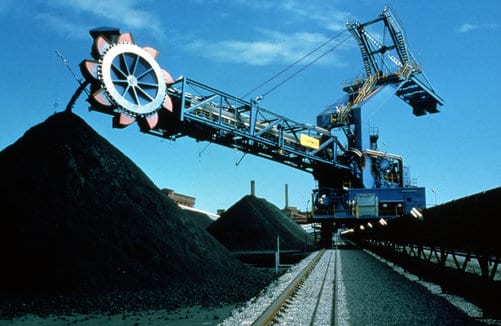 In the same week that the Abbott government came under international pressure to lift its game on its climate policy and emissions reduction targets, a new report has warned that 90 per cent of the nation’s coal reserves must stay in the ground – or risk blowing the world’s carbon budget.
In the same week that the Abbott government came under international pressure to lift its game on its climate policy and emissions reduction targets, a new report has warned that 90 per cent of the nation’s coal reserves must stay in the ground – or risk blowing the world’s carbon budget.
Released on Thursday, the Climate Council Report – Unburnable Carbon: Why we need to leave fossil fuels in the ground – argues that new investment in coal, oil and gas need to be reduced to zero as soon as possible in order to keep global temperature rise below the internationally accepted 2°C warming threshold.
This is because, in order to stay within the world’s carbon budget – the well accepted, scientifically-based method to determine how much carbon humanity can “spend” – the majority of the world’s fossil fuel reserves must stay in the ground: 62 per cent of it, for just a 50 per cent chance of meeting the 2°C limit; and 77 per cent of it for a 75 per cent chance.
These figures are not new, but they bear repeating. Particularly to Australia, when you consider that for coal alone, 88 per cent of global reserves are currently considered unburnable.
As the report notes, this translates to over 90 per cent of Australia’s coal reserves being redundant, even under the most generous carbon budget.
“When it comes to coal use, it’s reached a point where we really have to tighten our belts,” former BP Australasia president and Climate Councillor Gerry Hueston said.
“New coal development in Australia doesn’t add up anymore economically, socially or environmentally.”
Of course, the Abbott government’s energy and environment policies are still nowhere near to factoring in this reality.
Mind you, they’re not the only ones with their heads down a coal mine. A report in the Guardian this week noted that the carbon locked up in coal, oil and gas reserves owned by the world’s biggest fossil fuel companies had grown by 10 per cent in the last five years, despite the repeated warnings that most existing reserves cannot safely be burned.
And if these companies and the governments which support them are “skeptical” about the science, they’re ignoring the current economic wisdom, too.
Earlier this week, global banking group HSBC released just the latest report warning that fossil fuel assets will become “non-viable” or “unburnable” – not just because of climate action, but also due to changing economics and the impact of new technologies, such as solar and storage.
Meanwhile, in Australia huge new coal mining and export developments, like in Queensland’s Galilee Basin, are being waved through by both federal and state governments, while Canberra continues to push the line is that coal is “good for humanity.”
Of course, that is precisely the opposite message to that which scientists have been trying to get across. As the report notes: “A 2°C rise in global temperature will have serious impacts on the lives and livelihoods of many people world-wide, and could trigger major changes in the Earth System.”
Just this week, Norwegian researchers have come across some of the “largest waves ever”, generated as melting ice in polar regions results in more open water – creating a feedback loop that could doom the Arctic ice cap.
Here in Australia, NSW has this week endured nearly two days of cyclonic winds and torrential rain that has claimed three lives and left 200,000 homes without power, in the latest “once-in-a-decade” storm.
“We are already at a global temperature rise of almost 1°C and climate change is making many extreme weather events in Australia significantly worse,” said report author and Climate Council Councillor Professor Will Steffen.
“A 2°C rise in global temperature will have very serious impacts on people worldwide, and could trigger major changes …like the eventual melting of the Greenland ice sheet.
“If we want to meet our international obligations to keep below the 2 degree target, not only can we not develop any new coal mines but we also have to have a planned phase-out of our existing fossil fuel extraction and usage.”
To this end, the report finds that replacing Australia’s ageing coal fleet with modern renewable energy capacity would help us meet our share of the carbon budget with little or no economic cost – in fact, probably with economic benefits.
“If we want a decent chance (75%) of meeting the 2 degree target, we will blow through the carbon budget in less than two decades at the current rate,” he said.
“Energy policies that support substantial fossil fuel use, such as government investment in new coal infrastructure, are simply inconsistent with tackling climate change.”







